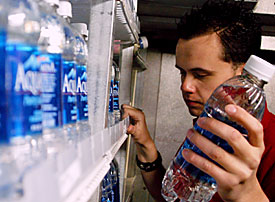 |
|
DEREKH FROUDE/Arizona Daily Wildcat
|
Chris Clingensmith, a molecular and cellular biology sophomore, prepares for the imminent hot weather of spring by stocking water bottles in the U-mart last week. Students are encouraged to drink up to eight glasses of water per day as the weather heats up.
|
|
By Tessa Hill
Arizona Daily Wildcat
Tuesday April 29, 2003
Experts advise students to avoid dehydration, skin cancer by drinking plenty of water, wearing sunscreen
With summer almost here, students are ditching their winter wardrobes and heading outside. But for many, the great outdoors might not be so great.
In Tucson's desert climate, the temperature can easily reach 90 degrees in the spring months, but with the lack of humidity it is often difficult to feel the heat's intensity, which can cause dehydration and severe sunburns.
"The problem with our heat is that, with as dry as it is, you don't perceive the heat," said Dr. Gale Begemann, nutrition counselor at Campus Health. She went on to say that most people who are not from desert climates often don't recognize the extremity of the heat.
"Water is our main cooling mechanism, so it is important that we stay hydrated," she added.
How to stay hydrated:
· Drink 2-4 cups of water for every hour of activity
· Two hours before activity drink at least 2 cups of water
· 15 minutes before activity drink 1-2 cups of water
· Every 15 minutes during activity drink 1/2-1 cup water
|
Begemann said that because thirst lags behind dehydration, when people begin to feel thirsty, their body is already 1 to 2 percent below the body's hydration level. This decrease can cause the beginning symptoms of dehydration.
"Grogginess, irritability, lethargy and a feeling of heaviness are the first signs," Begemann said, adding that the quickest way to recover from a dehydration spell is to drink cool, not ice cold, beverages because they are the most palatable.
On average, Begemann recommends drinking eight glasses of water per day to maintain a consistent level of hydration. But those who are very active, especially outdoors, should drink more.
If someone is not getting enough fluids, there are several ways to determine dehydration.
Checking urine color and clarity is the easiest way to tell if you are hydrated, Begemann said.
"(Urine) should be no darker than a sheet of yellow legal paper and fairly clear and odorless," she said. "Darker, cloudy and smelly urine is a sign of dehydration."
Meg Nimo, a communication sophomore said she always checks her urine color and remains hydrated by drinking at least five glasses of water each day and always having a water bottle on hand.
"I work out, and I know it is important for my health, especially in the summer," Nimo said, adding that she usually drinks more than five glasses of water in the summer because she is outdoors in the heat.
Consistent hydration is fairly easy to maintain, by making sure to mix caffeinated and alcoholic beverages with water and other caffeine-free beverages, Begemann said.
"Staying on top of your water intake and drinking whether you are thirsty or not is the best overall strategy," she said.
While heading outdoors, Begemann said students must remember to bring extra water.
"People often underestimate the heat, and if they are out hiking on a trail it can be very dangerous," Begemann said. Citing her own personal experience at Sabino Canyon, she said, "It is very frightening to feel yourself getting weaker and weaker."
Although dehydration's effects are temporary, Tucson's strong sun can cause severe sunburns that cause a greater risk for more permanent damage such as skin cancer.
The most common type of skin cancer is non-melanoma and comes in two forms, both of which are caused by sunburns and sun exposure.
"The skin is the biggest organ and it needs to be protected," said Carolyn Smith, regional communications manager for the Southeastern Arizona Regional office of the American Cancer Society.
"The more exposure at an early age, the more damage is possible," said Smith, who added that although most cancer develops later in life, habits developed earlier in life can affect a person's health forever.
Smith that staying out of the sun between 10 a.m. and 4 p.m., when the sun's ultra-violet rays are the strongest, applying sunscreen 30 minutes before going outdoors, wearing sunglasses and covering as much skin as possible are the best ways to protect your skin from the sun.
The American Cancer Society recommends avoiding tanning beds and using a daily sunscreen with a sun protection factor (SPF) greater than 15.
Michelle Rust, a criminal justice sophomore, said that in addition to keeping tabs on how much water she drinks, she wears sunscreen whenever she is outside for prolonged periods of time.
"(Cancer) runs in my family, so I have to wear sunscreen," said Rust who added that although she grew up under the Arizona sun, her fair skin allows her to easily get sunburned.
Smith said that although the sun can be potentially harmful, it is still possible to have fun and be safe.
"You have to remember to be safe and check for any changes in your skin," Smith said. She recommended that students contact a doctor immediately if they notice any noticeable changes occur in moles, beauty marks or freckles.
For more information on skin cancer visit www.cancer.org.

